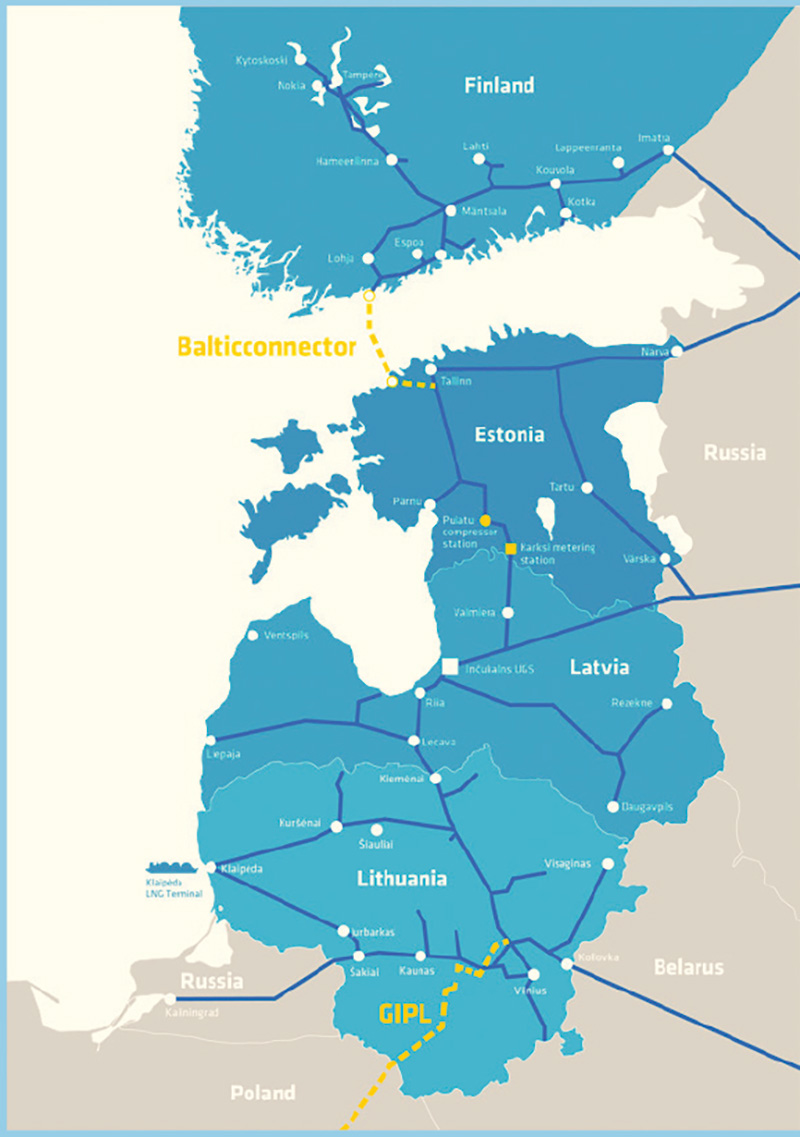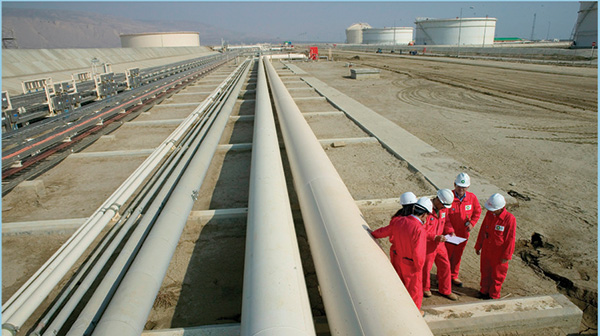March 2019, Vol. 246, No. 3
Global News
Global News
Finland, Estonia and Latvia Sign Deal for Single Gas Tariff Zone
Gas transmission operators of Finland, Latvia and Estonia signed an agreement on to set up a single gas transmission tariff zone for the three countries from the start of 2020.

The agreement fulfills a goal announced in 2017, when the Finnish government authorized state-owned Baltic Connector Oy to start construction on the Balticconnector natural gas pipeline and announced it would open wholesale and retail gas markets to competition in time for the project’s scheduled completion in early 2020.
The 7.2 MMcm/d Balticconnector pipeline, which will transport gas across the Baltic Sea between Estonia and Finland, is being built to help diversify the region’s gas supplies and reduce reliance on Russia. Another project, Baltic Pipe, is planned to supply Norwegian gas production to Poland via Denmark and Sweden. It could ultimately deliver gas from Norway to Finland via the Gas Interconnection Poland-Lithuania (GIPL) project.
The agreement signed by Finland’s Gasum, Estonia’s Elering and Latvia’s AS Conexus Baltic Grid allows transportation of gas across the countries without additional charges by unifying entry point tariffs on the external borders of the region and removing commercial interconnection points between countries.
The deal is expected to lead to higher market liquidity by making it easier for shippers and traders to sell gas to the whole region, the three grid operators said. It outlines the cost structure for transmission and how related compensation and entry revenues will be distributed among them.
France Makes Biogas Support Conditional on Cutting Cost
France is ready to subsidize renewable gas infrastructure only if the industry can substantially lower its costs, the government said, citing biogas costs at four times that of natural gas imported by pipeline or LNG tankers from countries like Russia, Norway, Algeria or Qatar.
Under its draft PPE 10-year energy plan, the government set a target for biogas to account for 7-10% of gas consumption by 2030 from well below one percent today – if costs can fall rapidly.
Produced from methanisation of agricultural and other biological waste, biogas still costs about four times more than natural gas imported by pipeline or LNG tankers from countries like Russia, Norway, Algeria or Qatar.
Although France is way behind biogas pioneers like Denmark and Germany, the sector is growing. The amount of biogas injected in GRTgaz’ pipelines rose 75 percent to 714 GWh last year. Installed capacity is 1.2 TWh at 76 sites, and plans have been drawn for 661 new projects with a total capacity of 14 TWh.
A year ago, French utility Engie’s CEO Isabelle Kocher said biogas has the potential to grow from about 1% of gas consumption in France to 10% by 2025, 30% by 2030 and 100% by 2050.
Over the next decade, the government wants to reduce total French gas consumption from 493 TWh in 2017 to about 420 THh in 2028 through energy savings and better insulation.
Mexico’s Fuel Thefts Continue Despite Crackdown, Deadly Blast
Mexico’s newly elected President Andres Manuel Lopez Obrador announced a crackdown on illegal pipeline taps in December, vowing to end Mexico’s rampant fuel theft. But the problem is proving more resilient – and the response costlier – than might have been anticipated.
Lopez Obrador’s order for state-owned Pemex to transport fuel overland by tanker trucks instead of pipeline resulted in widespread shortages and long lines at gas stations. The practice has cost Pemex billions of dollars and deprived the government of badly needed tax revenue.
The government says it has arrested 558 people accused of stealing fuel, frozen bank accounts and deployed soldiers to guard key Pemex installations. But illegal taps continued, including one that erupted in a fireball and killed at least 117 people in Tlahuelilpan when a crowd gathered to pilfer gasoline from the damaged pipe.
The fuel bottlenecks have eased. But theft is so endemic that the culture will be hard to break. For example, only days after the explosion, soldiers found more than a dozen more illegal taps within a few miles of Tlahuelilpan.
Activists Arrested Attempting to Shut Down Oil Pipeline
Four climate-change activists from the Catholic Worker movement were arrested in an attempt to shut down an Enbridge oil pipeline in north-central Minnesota.
The four broke into a fenced area southeast of Grand Rapids that contains shut-off valves for three Enbridge pipelines, then called to warn the company of their plans to turn off the Line 4 pipeline, according to a spokesperson for the group. In a statement, they said it was “time to take personal responsibility for preventing the dangerous expansion of the oil industry…”
Calgary-based Enbridge itself shut down the pipeline remotely, their spokesperson said, and the four were arrested by Itasca County sheriff’s deputies. No oil was spilled.
“The actions taken to trespass on our facility and tamper with energy infrastructure were reckless and dangerous,” Enbridge spokesperson Juli Kellner said via email. “The people involved claimed to be protecting the environment, but they did the opposite.”
Line 4 is one of five Enbridge pipelines that carry Canadian crude from Alberta to Enbridge’s terminal in Superior, Wisconsin. The company’s plan to replace its aging Line 3 was approved by Minnesota regulators last year, but opponents are appealing the decision in court.
Israel Minister: Gas Exports to Egypt to Start Within Months
Israel will begin exporting natural gas to Egypt in a few months’ time, Energy Minister Yuval Steinitz said, marking a key step in the plans to sell expanding gas production and bolster diplomatic ties.
Steinitz did not give a specific target for initial exports, but said shipments would double after the huge Leviathan field in the eastern Mediterranean comes fully online in November.
He said Israeli exports to Egypt were expected to reach 7 Bcm annually over 10 years. About half the exports were expected to be used for Egypt’s domestic market and half to be liquefied for re-export, he added.
In an interview with Reuters in Cairo, Steinitz said Israel and Egypt had discussed how to extend cooperation on natural gas, including through exports. He said Israel was hoping to sign a deal “in a few weeks’ time” for construction of the 1,243-mile (2,000-km) East Med pipeline, which would cross from Israel and Cyprus into Greece and Italy.
“Israel exporting natural gas to the Arab world and also to Europe — this is something that sounded like a dream or a fantasy just 10 or 15 years ago,” said Steinitz, the first energy minister to visit Egypt since the 2011 uprising there.
US Government Appeals Ruling Against Keystone XL
The Trump administration is appealing a court ruling that blocked the Keystone XL oil pipeline.
Justice Department attorneys in February appealed the November ruling from U.S. District Judge Brian Morris that blocked a construction permit for the 1,184-mile (1,900-km) pipeline.
The line sponsored by Calgary-based TransCanada would begin in Alberta and shuttle as much as 830,000 bpd of crude through a half dozen states to terminals on the Gulf Coast.
It was rejected by former President Barack Obama in 2015. That decision was reversed in 2017 by President Donald Trump, who has promoted the $8 billion project as part of his effort to boost American energy industries.
After environmental groups sued, Morris said the administration had not fully considered potential oil spills and other impacts and that further reviews were needed.
IEA: Global LNG Trade Growth Fuels Expansion
Annual trade in liquefied gas grew faster than 10 percent in both 2017 and 2018, according to the International Energy Agency (IEA).
Trade in liquefied gas is expected to rise by more than two-thirds in the next 20 years, said Jean-Baptiste Dubreuil, an analyst with the Paris-based group.
“It will be instrumental in the evolution of natural gas toward a more diversified, flexible and global market,” Dubreuil said, noting that the recently-announced Golden Pass LNG project on the Texas Gulf Coast is expected to be the first of many similar announcements by energy companies this year.
Dubreuil said other LNG facility expansions are expected to come from the U.S., Russia, Africa and Qatar.
Qatar Petroleum, a leading exporter of liquefied natural gas, has announced plans to invest $20 billion in the U.S. as it seeks to continue expanding beyond its home borders.
On Jan. 1, Qatar left OPEC after a nearly two-year trade embargo against it by the oil cartel’s leader, Saudi Arabia, and the United Arab Emirates, Bahrain and Egypt.
ExxonMobil, Qatar Petroleum to Expand LNG Export Plant in Texas
Exxon is betting big on the future of exporting natural gas, announcing plans with Qatar Petroleum in February to proceed with a $10 billion project to export liquefied natural gas from a plant on the Texas Gulf Coast.
The companies said construction at their Golden Pass joint venture’s plant in Sabine Pass, Texas, would start before April, and the export operation is expected to begin running in 2024.
The plant, which started in 2010, originally was designed as an LNG import facility, but soaring U.S. gas production – including significant output from the Permian Basin – along with growing worldwide demand for LNG have shifted patterns of global energy trade.
Exxon and Qatar Petroleum say the export facility in Texas will be able to produce about 16 million tons of liquefied gas per year.
Qatar Petroleum owns 70% of Golden Pass and Exxon holds the other 30% after agreeing to buy out ConocoPhillips’ 12.4% stake in the existing liquefied natural gas import terminal and pipeline. That purchase is awaiting regulatory approval.
BP’s Shah Deniz Plans Foretell Expansion of Southern Gas Corridor
The Southern Gas Corridor is on schedule to deliver first gas to Europe in 2020 from the second stage of Azerbaijan’s giant Shah Deniz field, and pipeline capacity along the still-developing Southern Gas Corridor could be further expanded to accommodate planned production growth, a regional BP executive said.

“We expect flat oil production from ACG (Azeri-Chirag-Guneshli) and a rise in gas production at Shah Deniz in 2019 as we will continue to ramp up production on Shah Deniz throughout this year and ... in the next few years,” Bakhtiyar Aslanbayli, BP’s vice president for Azerbaijan, Georgia and Turkey.
The Shah Deniz I field has been pumping gas since 2006, while output from Shah Deniz II is expected to reach 16 Bcm of natural gas per year, with 10 Bcm earmarked for Europe and 6 Bcm for Turkey. Production at Shah Deniz increased to 11.5 Bcm in 2018 from 10.2 Bcm in 2017, Reuters reported, while condensate output was essentially flat at 2.5 million tons.
Aslanbayli said the capacity of pipelines along the Southern Gas Corridor running from Azerbaijan to Europe could be expanded if and when additional volumes of gas become available.
“That could be new sources of supply from Azerbaijan, from other fields,” he said, noting the “promising” Shafag-Asiman gas field, where BP plans to drill the first exploration well this year.
“If everything is as promising as we expect, the Shafag-Asiman will actually have huge gas resources, which could be definitely comparable to Shah Deniz,” he said. P&GJ





Comments